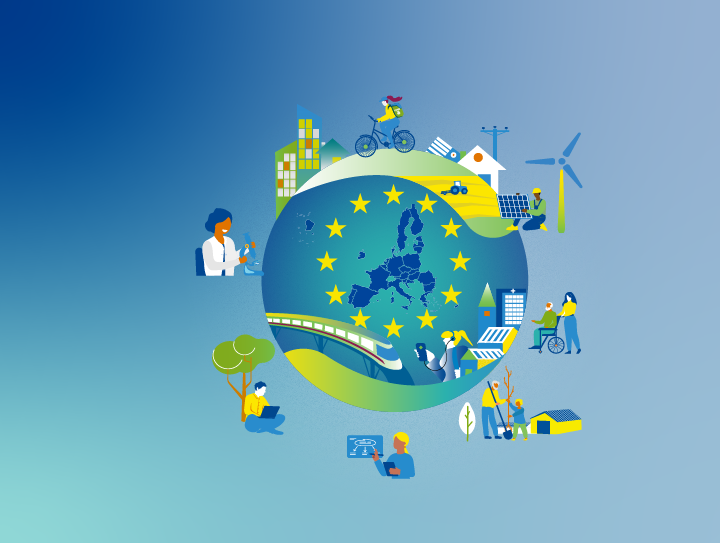591 resultados encontrados
Skip results of view Noticias

Every year on September 15, the world recognises the International Day of Democracy , a day dedicated to promoting and reviewing the state of democracy across nations. Established by the United Nations in 2007, this day serves as a reminder of the importance of inclusive participation, accountability, and the rule of law in fostering stable and just societies. This year’s theme, ‘AI as a tool for good governance’, highlights the potential of artificial intelligence in enhancing democratic processes. Governments and organisations are increasing their use of AI to improve public services

This week’s highlight focuses on our data.europa Academy ‘Portal’ courses, that are designed to equip data professionals with the knowledge and skills needed to navigate through the open data landscape. There are two insightful courses about finding and understanding data portals and how to use the data that you have gathered. Our course ‘ Moving towards Data Spaces ’ provides content on the concept of data spaces, which support data sharing across sectors and shape our society and economy. Through a combination of e-learnings, webinars, and reading materials, you will explore the role of open
Register and join our next data.europa Academy webinar ‘ Beyond Europe: global perspectives on open data excellence ’, scheduled for 20 September from 14:00 to 15:00 CE ST. This event will offer valuable insights into how open data practices are being shaped and implemented across different regions of the world. Understanding how other countries approach open data can provide European countries with new strategies and ideas to enhance its own initiatives. One of the key themes of the webinar will be the exploration of global best practices. Speakers will discuss innovative approaches to open

Our recently published report ‘ Granular Data Governance Systems for Open Data ’ explores the transformative effects of the Data Governance Act (DGA) on open data ecosystems across Europe. This study delves into the complexities of data governance and its implications for public sector information management. It helps to understand the opportunities created by the DGA for open data and the effect on data sovereignty for individual citizens. The DGA, which came into effect on 24 September 2023, introduces several activities aimed at supporting data sharing and the setup and development of

Our data.europa Academy courses are designed to provide you with in-depth knowledge and practical skills on open data policies, legal frameworks, business applications, and data governance. Our Academy theme focused on policy provides five unique courses with a total of 11 lessons with different content formats like e-learnings, webinars, and readings. The introductory course, ‘ Introducing Open Data ’ offers a foundational understanding of open data concepts and benefits. With the e-learning ‘ What is open data ’, participants get to know the basics of open data and what it means for digital
Mark your calendars for 13 September 2024 from 10:00 to 11:30 CEST , and join us for the insightful webinar ‘ Emerging Geospatial Trends 2024: opportunities for data.europa.eu in the era of digital twins ’. Gain new knowledge about this transformative trend with illustrative examples from external speakers and be part of the discussion. Data that contains location-related information about the surface of the Earth is known as geospatial data, or geodata. Digital twins are a virtual replica that can help make predictions based on data analysis . Therefore, at the forefront of technological

The integration of open data in the financial sector is changing the way individuals and institutions interact with financial services. Open data in finance refers to the sharing of financial information, which expands beyond simple banking transactions to encompass a broader range of financial products, including investments, mortgages, and insurance. This type of information sharing can help financial institutions make more informed decisions and can provide consumers with a personalised approach. Following the shift to digitalisation in the financial sector, the Commission has decided to

The introduction of Minimal Interoperability Mechanisms (MIMs) marks a big development in the pursuit of shaping Europe’s digital future and ensuring seamless data exchange across the continent. Interoperability supports different systems to communicate and share data effectively between one another. MIMs are standards and technical specifications that help cities, communities, and suppliers to replicate data or let data easily flow between systems. In Europe, MIMs Plus was developed based on the original MIMs framework to cater to the specific needs of European cities and legislation. This is

The European Week of Regions and Cities , the biggest annual Brussels-based event dedicated to regional and urban policy, is taking place from 7 to 10 October 2024. This year’s event promises to be a dynamic platform for regional and local authorities, experts, and academics to exchange ideas and best practices. With over 100 sessions and workshops, participants will explore key topics such as green transition, digital transformation, and social inclusion. The motto of the event is ‘Empowering Communities’, and the following themes will provide a platform for discussion between multiple

We just launched our yearly data.europa.eu user satisfaction survey . We would be happy to hear any feedback you may have for us regarding the portal, the data.europa academy, and more! Your opinion will help us further improve the portal’s content and features. As the official portal for European data, we provide access to open data from public administrations throughout Europe. We organise many webinars and events to help you improve your open data skills. On the portal, you also find data stories, studies, and news pieces on open data and related topics. The fully anonymous survey
